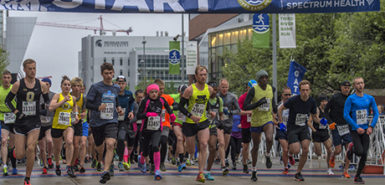
You know all about the benefits of exercise.
It boosts your mood.
Makes you stronger.
Improves your health.
But as you embrace physical fitness, remember to keep one important element in your training program: Rest.
“You need to incorporate a day of rest from exercise at least once per week,” said Matthew Axtman, DO, a sports medicine specialist with Spectrum Health Orthopedics.
That’s a tough concept for some athletes to embrace. They insist they must exercise every day—both for physical and psychological benefits.
“The opposite is actually true,” Dr. Axtman said.
Research has shown that exercising every day can hinder your ability to reach peak performance.
Why rest?
“A rest day allows healing, rebuilding, strengthening and conditioning of multiple body structures,” Dr. Axtman said.
When you exercise, you cause microscopic tears to your muscle tissue. As your body heals this damage, it increases the bulk of the muscle and improves its strength and function.
By resting for a day, you optimize your body’s healing response. This will improve your performance and muscle structure—and make you a better athlete.
A rest day can also help decrease overuse syndromes, muscle strains and tendinitis.
Your bones also need rest. Like your muscles, they undergo stressors at a cellular level that cause microscopic stress reactions. These stress reactions can cause your body to create new bone and improve the health and strength of your bones.
“By improving the strength of the bone, you decrease the risk of injury and stress reactions or stress fractures that may sideline your training,” Dr. Axtman said.
Exercise without rest can affect your mood, too—causing irritability, mood swings, loss of appetite, sleep disturbances and fatigue.
Taking a day to rest and recover can reduce exercise fatigue and burnout.
How it’s done
Taking a break from training can be a challenge for some athletes.
“If you absolutely can’t sit still, light activity that does not engage the muscles, joints and bones too much is OK,” Dr. Axtman said.
A stretching program or yoga will still allow your body to heal.
Remember, a rest day is not the same as cross training. Runners shouldn’t bike 30 miles and call it “rest.”
“Cross training is important, but a rest day is not a day to cross train,” he said. “That will put stress on your muscles and bones and won’t allow healing to occur.”
Ditch the guilt
If your fitness routine runs into problems—lack of motivation, decreased performance or injuries—consider whether you need to add a day of rest to your routine. It could be a simple solution.
“Don’t feel guilty for taking a day off,” Dr. Axtman added. “In the long run, it will improve your conditioning, strength and performance. Even the most elite athletes do it.”
 /a>
/a>
 /a>
/a>
 /a>
/a>
Great post, Lots of helpful tips! Thanks so much for sharing and thank you so much for hosting as well.